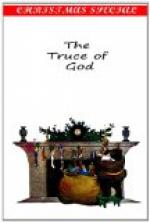There were some who regretted this peaceful result, among whom the stern Baron of Stramen was conspicuous for his open denunciation of the treaty nor could the polished Lord of Hers conceal his contempt for a compromise, which threw away a present advantage, in consideration of the fear-extorted oath of a perjured debauchee. Rodolph himself deeply regretted that the Pope would not consent to crown him king, a consummation he required before acting against his brother, lest he should be branded as a rebel. Even Gilbert and Henry of Stramen were crestfallen in the blight of all their budding hopes. Of all our Suabian friends, Father Omehr was the only one who rejoiced in this amicable termination of the council, and who devoutly returned thanks to God for averting a direful war, and proclaiming, in the favorite language of heaven, “Pax fiat!”
During two months and a half, Henry buried himself in solitude at Spire. Rodolph remained watchful and expectant, now at Zurich, and now in Saxony. All was calm in the lordships of Hers and Stramen. The Lady Margaret was lamenting the absence of Father Omehr, who had been summoned to Rome, and whose missionary duties were performed by the pious Herman.
The year of grace was drawing to a close, and the proud baron began to hope that the emperor would permit it to pass without observing the stipulation in the treaty to repair to Rome and ask pardon of the Pope. The new year had begun, and January was half over when the King of Arles was startled with the intelligence that Henry had purchased from Adelaide, the widow of the Margrave Otho, a free passage into Italy, and, in spite of snow and ice, had crossed the Alps, and was approaching the fortress of Canossa, whither Gregory had retired. At first it was rumored that the monarch had gone to depose the Pope, and the Duke of Suabia secretly exulted in the prospect of instant action. But it was soon ascertained that Henry presented himself in the character of a suppliant, and the result of his application was awaited with breathless interest.
Early in the spring of 1077, toward the close of a cold, bright day, Rodolph was seated in his palace at Zurich, surrounded by Albert of Hers and Gilbert, on one side, and on the other, by Sandrit and Henry of Stramen. This strange meeting, though unexpected and unwelcome to the hostile knights, was designed by Rodolph, who thought that by thus accustoming them to restrain their passions in his presence, and by distinguishing them with equal confidence, aid praising both sides in equal measure, he might control, in some degree, the antipathies he could not entirely subdue. But the barons maintained a stern, unyielding reserve, and Gilbert studiously avoided the disdainful gaze of Henry of Stramen. The lamps were scarcely lighted when a messenger from Rome was announced, and the next moment Father Omehr entered the room.
The nobles rose, and, greeting the venerable missionary respectfully and affectionately, conducted him to a seat, and gathered about him. When the attendants had been dismissed, and the duke invited him to proceed, Father Omehr thus began to describe the interview between the Pope and the king, to which he had been an eye-witness:




